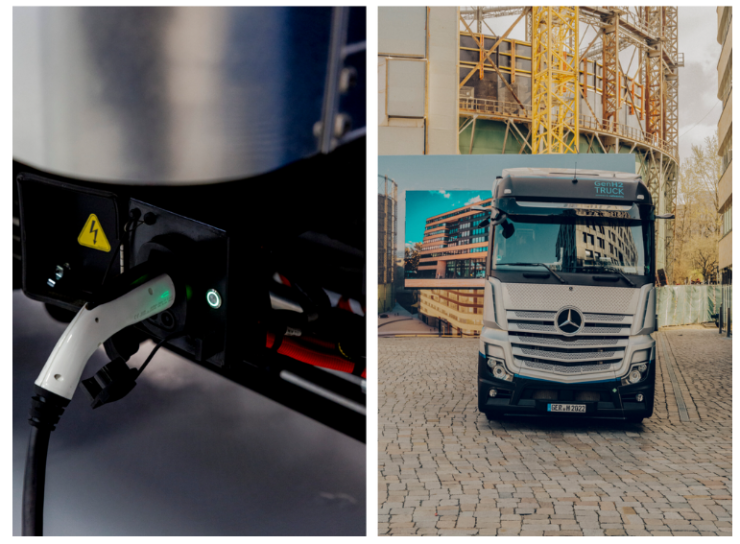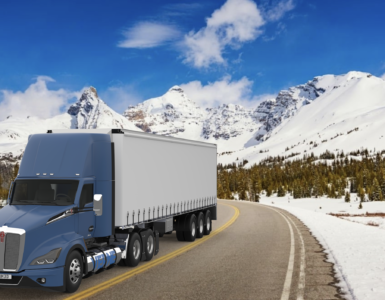NYT – Truck makers face A tech dilemma: batteries or hydrogen?
Under pressure to cut emissions, truck manufacturers are choosing between batteries and hydrogen fuel cells. Wagering incorrectly could cost them billions of dollars.
Even before war in Ukraine sent fuel prices through the roof, the trucking industry was under intense pressure to kick its addiction to diesel, a major contributor to climate change and urban air pollution. But it still has to figure out which technology will best do the job.
Truck makers are divided into two camps. One faction, which includes Traton, Volkswagen’s truck unit, is betting on batteries because they are widely regarded as the most efficient option.
🔥 What about we co-host a webinar? Let's educate, captivate, and convert the hydrogen economy!
Hydrogen Central is the global go-to online magazine for the hydrogen economy, we can help you host impactful webinars that become a global reference on your topic and are an evergreen source of leads. Click here to request more details
The other camp, which includes Daimler Truck and Volvo, the two largest truck manufacturers, argues that fuel cells that convert hydrogen into electricity — emitting only water vapor — make more sense because they would allow long-haul trucks to be refueled quickly.
The choice that companies make could be hugely consequential, helping to determine who dominates trucking in the electric vehicle age and who ends up wasting billions of dollars on the Betamax equivalent of electric truck technology, a potentially fatal error.
It takes years to design and produce new trucks, so companies will be locked into the decisions they make now for a decade or more.
Andreas Gorbach, said:
It’s obviously one of the most important technology decisions we have to make.
Andreas Gorbach, a member of the management board of Daimler Truck, which owns Freightliner in the United States and is the largest truck maker in the world.
The stakes for the environment and for public health are also high. If many truck makers wager incorrectly, it could take much longer to clean up trucking than scientists say we have to limit the worst effects of climate change.
In the United States, medium- and heavy-duty trucks account for 7 percent of greenhouse gas emissions. Trucks tend to spend much more time on the road than passenger cars. The war in Ukraine has added urgency to the debate, underlining the financial and geopolitical risks of fossil fuel dependence.
While sales of electric cars are exploding, large truck makers have only begun to mass-produce emission-free vehicles.
Daimler Truck, for example, began producing an electric version of its heavy-duty Actros truck, with a maximum range of 240 miles, late last year. Tesla unveiled a design for a battery-powered semi truck in 2017 but has not set a firm production date.
Cost will be a decisive factor. Unlike car buyers, who might splurge on a vehicle because they like the way it looks or the status it conveys, truck buyers carefully calculate how much a rig is going to cost them to buy, maintain and refuel.
Battery-powered trucks sell for about three times as much as equivalent diesel models, although owners may recoup much of the cost in fuel savings.
Hydrogen fuel cell vehicles will probably be even more expensive, perhaps one-third more than battery-powered models, according to auto experts. But the savings in fuel and maintenance could make them cheaper to own than diesel trucks as early as 2027, according to Daimler Truck.
Paul Gioupis, chief executive of Zeem, said;
The environmental side is hugely important, but if it doesn’t make financial sense, nobody’s going to do it.
A company that is building one of the largest electric vehicle charging depots in the country about one and a half miles from Los Angeles International Airport. Zeem will recharge, service and clean trucks for clients like hotels, tour operators and delivery companies.
Proponents of hydrogen trucks argue that their preferred semis will refuel as fast as conventional diesel rigs and weigh less. Fuel cell systems are lighter than batteries, an important consideration for trucking companies seeking to maximize payload.
Fuel cells tend to require fewer raw materials like lithium, nickel or cobalt, which have been rising in price. (They do, however, require platinum, which soared in price after Russia invaded Ukraine. Russia is a major supplier.)
A new truck costs $140,000 or more. Owners anxious to clock as many cargo-hauling miles as possible won’t want their drivers to spend hours recharging batteries.
Mr. Gorbach of Daimler said,
The longer the range, the higher the load, the better it is for hydrogen.
But other truck makers argue that batteries are much more efficient, and getting better all the time. They point out that it takes prodigious amounts of energy to extract hydrogen from water. Instead of using electricity to make hydrogen, battery proponents say, why not just let the energy directly power the truck’s motors?
That argument will become stronger as technical advances allow manufacturers to produce batteries that can store more energy per pound and that can recharge in minutes, rather than hours.
A long-haul truck that can recharge in half an hour is a few years away, said Andreas Kammel, who is in charge of electrification strategy at Traton, whose truck brands include Scania, MAN and Navistar.
Mr. Kammel said:
The cost advantage is here to stay, and it’s significant.
The hydrogen camp acknowledges that batteries are more efficient. All the major truck manufacturers plan to use batteries in smaller trucks, or trucks that travel shorter distances.
The debate is about what makes the most sense for long-haul trucks traveling more than 200 miles a day, the kind that carry heavy loads across the breadth of the United States, Europe or China.
Most countries will struggle to produce enough electricity to drive fleets of battery-powered trucks, Daimler and Volvo executives say, arguing that hydrogen is a potentially unlimited source of energy.
They envision a world in which countries that have a lot of sunlight, like Morocco or Australia, use solar energy to produce hydrogen that they send by ship or pipeline to the rest of the world.
Gerrit Marx, the chief executive of IVECO, a truck maker based in Italy, noted that Milan suffers power outages in summer when people run their air-conditioners. Just imagine, he said, what will happen when people start plugging in electric vehicles.
“If you have heavy-duty trucks also on the grid for charging, it’s not going to work,” he said. IVECO is manufacturing trucks for Nikola, the troubled American start-up that plans to offer battery-powered and hydrogen fuel cell vehicles.
Hydrogen is also the only practical form of emission-free power for energy-hungry construction equipment or municipal vehicles like fire trucks, Mr. Marx said.
Much of the hydrogen produced is extracted from natural gas, a process that generates more greenhouse gases than burning diesel. So-called green hydrogen produced with solar or water power is scarce and expensive.
Hydrogen enthusiasts say the supply will expand quickly, and the price will come down, because of demand from steel, chemical and fertilizer producers that are also under pressure to reduce emissions. They will use hydrogen to run smelters and other industrial operations.
Lars Stenqvist, a member of the executive board of Volvo who is responsible for technology:
Less than 10 percent of green hydrogen will be directed to road transport.
“We will sort of piggyback on the demand and infrastructure from other industries.”
Hydrogen has support from a formidable alliance of large corporations, H2Accelerate, which includes the truck makers Daimler, Volvo and IVECO; the energy companies Royal Dutch Shell, OMV of Austria and TotalEnergies of France; and Linde, a German producer of industrial gas.
Daimler and Volvo, normally intense rivals, have teamed up to develop fuel cells that convert hydrogen to electricity.
Hydrogen boosters have been wrong before. In the 1990s and early 2000s, Daimler and Toyota invested heavily to develop passenger cars that would run on hydrogen fuel cells. But the price of batteries fell, and their performance improved faster than that of hydrogen cars.
(Daimler Truck and the Mercedes-Benz car division have since split into separate companies. The car division is no longer selling hydrogen vehicles.)
To be sure, battery-powered trucks will also require major investment in high-voltage charging stations and other infrastructure. But building a charging network is likely to be much less expensive than establishing a green hydrogen industry along with the pipelines and tankers needed to transport the gas.
Fears that the electrical grid can’t handle a fleet of battery-powered trucks are overblown, Mr. Kammel of Traton said. Long-haul trucks will tend to charge at night, when demand from other energy users is low, he said.
In the United States, he said, big trucks spend a lot of time in Midwestern and Western states with plenty of wind and solar energy.
Whoever is right, battery-powered trucks will hit the road first. Daimler doesn’t plan to begin mass-producing a hydrogen fuel cell truck until after 2025, and in the meantime is planning to offer battery power as an option for smaller trucks, or large trucks that travel limited distances. Volvo and IVECO are pursuing similar strategies.
The big risk for those companies is that the affordability and performance of batteries, which have already exceeded expectations, could make hydrogen trucks obsolete before they get to market.
“The convenience disadvantages keep melting away,” Mr. Kammel said of battery power, “and the cost advantages keep growing.” Thanks for staying up to date with Hydrogen Central.
READ the latest news shaping the hydrogen market at Hydrogen Central
Truck Makers Face a Tech Dilemma: Batteries or Hydrogen?, April 11, 2022








